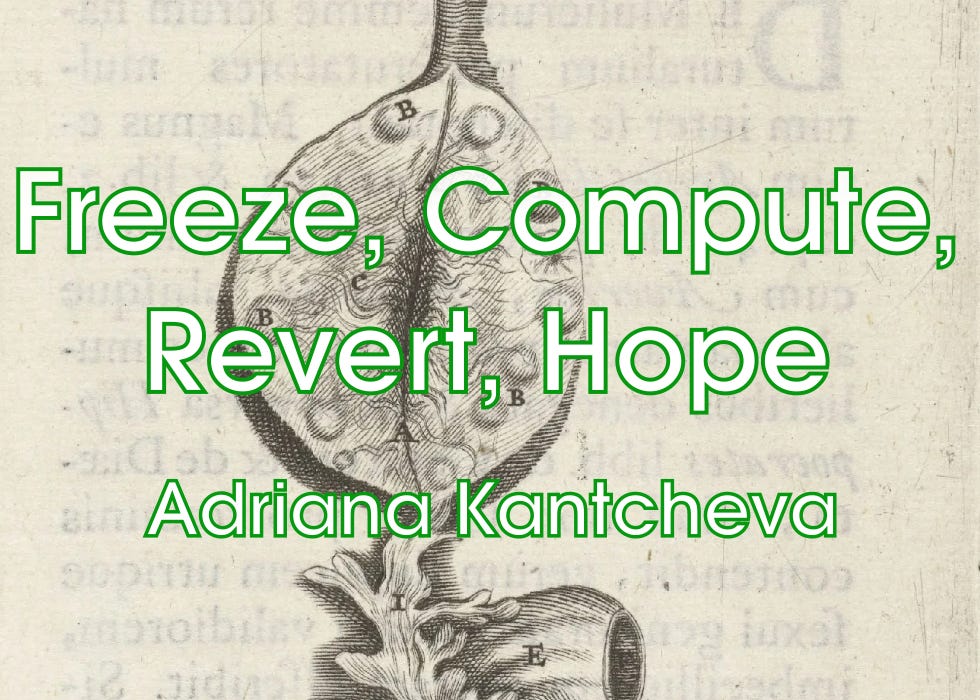Freeze, Compute, Revert, Hope — Part One
By Adriana Kantcheva
Happy New Story Sunday! This week, we have a wonderful story by the essentially pan-European writer Adriana Kantcheva. The cover image for this one was a tough choice, but we ultimately settled on an anatomical study of an ovary by Hendrik Bary from 1672. Other contenders were The Birth of Venus by Alexandre Cabanel and Henry Ford Hospital by Frida Kahlo (whose relevance will become apparent as the story proceeds) but were verging on inappropriately sensual or bloody, respectively. Also in the running were Dutch Golden Age paintings by Jacob Ochtervelt and Jacob Toorenvliet, depicting doctors attending to women. Should we be putting more effort into social media marketing than into picking cover images that people look at for 0.4 seconds? Probably, but running a magazine means getting to run it as poorly as you want. Enjoy. —The Editor
“Cryo-induced Somatic Temporal Quantum Entanglement Reduction?” I repeat, choking on the syllables. Months of chemo don’t help brainwork.
“Just call it CiSQER.” Dr. Olgmann settles beside my hospital bed, equipment beeping all around us.
On the side table, the huge bouquet of daisies my father sent crowds Dave’s single red rose. A flock of helium balloons from my mother floats above me, tied to the bed’s frame. Lately, her presents have been getting more and more toy-like, as if she were hoping to rewind time, unwilling to let go of her only daughter, who was about to die without giving her a single grandchild.
I stroke one of the daisies. “You say CiSQER is experimental?”
“Yes. But it’s your only chance, and we need volunteers.” Olgmann is direct for a doctor—unlike the ones treating me, who tiptoe around me out of professional inertia.
“And I must decide today?”
Olgmann checks again his paper-thin tablet. “Tomorrow might be too late.”
I peer up from my pillow, trying to discern if he’s insensitive or driven. I find his blunt statement refreshing despite its terrible truth. Until now, nobody’s been willing to give me a straight prognosis for my dwindling lifespan, though my father’s suspicious absence and my mother’s now near-permanent presence are clues enough. She is waiting outside the door even now, where Olgmann sent her.
“Explain what you’ll do in a way I understand,” I say.
Olgmann settles back in his chair, crossing his bony wrists. “You remember the headlines: ‘Quantum biologists revert a plant to a seedling’, ‘A rejuvenation procedure that REALLY works’, ‘Time travel of the body’.”
Of course I remember. My mother hasn’t switched off the TV for days. Even now, the otherwise transparent polymer rectangle is on, though muted. The discussions about CiSQER’s implications for aging and life expectancy are endless, the uproar about the need for new legislation—deafening. Funnily enough, almost nobody talks about medical uses.
“So, you are behind it all, Doctor.” Surprisingly, my sluggish brain supplies me with a fact I heard on a talk show. “But why freeze me?”
“What CiSQER does is revert every particle in the body to a quantum state in the past. In your case, our aim would be pre-ovarian-cancer. But temporal entanglement is even more complex than spatial entanglement. And the body is a mess. All this thermal and electrical activity. We need to still the chaos to make CiSQER work. The best way is cryogenics.”
I wiggle on my pillow, trying to hide the bright ceiling lights behind Olgmann’s bushy mop of hair. “There must be a catch.”
He doesn’t bat an eye. “Beyond the procedure’s novelty, there are other…possibilities. Literally. We might have to run CiSQER several times, as the quantum process in itself is a probabilistic phenomenon. There’s no way to choose the exact state your body would revert to. And since, in quantum terms, the body is vast, there’s an even vaster number of combinations of particle states it could return to.”
“In patient language, please.”
“We might have to do it several times to get the result we want, each time creating a different possible past version of you.”
“Ah.” I pause as if I have a choice. “Where do I sign?”
The Daily Tomorrow Adopt-A-Story Program!
For the cost of 12 months’ subscription, you can make a story and its afterword free, forever! You choose the story and we will make sure it never sees a paywall again. It’s like a gift you give the world. Your name (along with other adopters if any) will appear in a special header above the story, right where that button down there is now. Inscribe your name on the world of tomorrow, today!
Adriana Kantcheva writes speculative fiction about life’s emotional conundrums, often with a pinch of idealism. Born in Bulgaria, she lived in six countries before settling in Germany. She holds a PhD in molecular biology and has worked as a researcher, science editor, scuba diver, and flight attendant. Her fiction appears or is forthcoming in Short Édition, PodCastle, Escape Pod, and elsewhere. Learn more about Adriana at CatchingWords.com, or subscribe to her newsletter at sendfox.com/CatchingWords.
Copyright © 2025 Adriana Kantcheva


